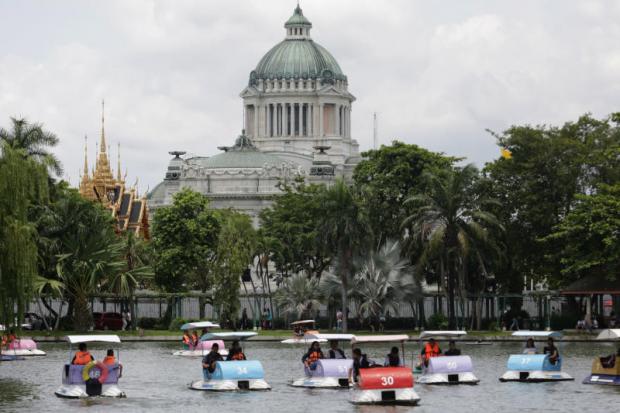
The next two weeks will be the last for Dusit Zoo, the country's first, and still most popular, zoo.
On Aug 31, the 80-year-old national institution will shut its gates for good. Its 1,000-plus animals will be relocated temporarily to six public zoos for three years until the construction of a new zoo at Klong 6 in Pathum Thani province is complete.
Yet, when Bangkok Post visited recently, there was hardly a sense of impending doom about the place. The animals remained proudly displayed in their areas while all facilities were open as usual. There wasn't even a sign notifying visitors of the zoo's forthcoming closure.
Director of Dusit Zoo Pitak Unson said there will be neither a special event nor a farewell party on its final day.
"For the last day, things will be done as they usually are, nothing special," Mr Pitak said.

The paddle boats on the pond inside the zoo, close to the Ananta Samakhom Throne Hall, always have been popular.
Dusit Zoo, popularly known as Khao Din Wana, was built by King Rama V and was the first zoo to be built in Thailand.
King Rama VIII opened the facility to the public in 1938 and, as of last year, it was drawing over two million visitors a year, generating 150 million baht in revenue.
The new site is expected to open in three years time and is located on over 300 rai land in Klong 6 in Pathum Thani's Thanya Buri district. The land plot was donated by the present monarch, King Rama X.
Over the past month, Dusit Zoo has seen attendance figures increase to almost double at times as people treasure its last moments at its current location.
Among the sea of visitors is Thanapat Matchasate, a 16-year-old student at Watkhemapitataram School. The zoo, he said, has a special place in his heart as his parents had often brought him to see "Mae Mali", a famous hippopotamus.
"I am a little bit sad as I have been here often since I was young. I love the place because it is a big green area in the capital. I hope the new zoo will give more also give importance to green spaces," he said.
Vitayakorn Rathidej, a retired official and keen amateur photographer in his 60s, told the Bangkok Post that he often comes to the zoo to practice taking pictures. "This shoot will be my last. The new location is too far away and too inconvenient for an old man like me. So, I came here to bid this place farewell," he said.
For visitors, the end might just be another business closure, but for some of the staff it is a life-changing experience.
Many have been in the same roles for decades, some even following in the footsteps of their parents before them.
While most of the zoo's 300 employee's will retain their jobs, all have been ordered to move along with the animals -- initially to temporary facilities and then to Pathum Thani.

A crow flies past a black bear standing on rocks in its enclosure.
Animal caretakers interviewed by Bangkok Post said they never imagined they would have to move in their lifetimes, but their main concern was the animals.
"We are zookeepers, we go where our animals are. I believe the new zoo will be better due to it being far larger which I think the animals will enjoy," said a senior staff member who is preparing for a three-year stint in Nakhon Ratchsima.
Yuthana Saisaeng, a 35-year-old caretaker, will be moving to Surin with "Pang Jim", the 37-year old female elephant she looks after. Like many of his colleagues, Mr Yuthana has been working at the zoo for over a decade. He said the changes would be a shock to the system, "But I go where Pang Jim goes. The elephant park in Surin will be better for her as Dusit Zoo is too small. Hopefully, she'll be able to meet old friends and make new ones there, too," he chuckled.
For Ku Deedoysakul, a 71-year-old photo shop assistant, the zoo's closure still hasn't quite sunk in yet.
"Even now, I have to repeat to myself that it is not a joke," said Mr Ku who has been working at the shop for over 40 years. Unlike the animal keepers and other staff, Mr Ku runs a private concession which will not be transferred elsewhere.
He recalls how things have changed: "Animals were once kept in holes and people needed to bend down to look at them. Now the welfare is much better," he said.

A boy plays with dinosaur egg replicas, which are exhibited at the zoo.
Yet his once flourishing photo business was in doldrums even before the park closure, largely due to the modern smartphone. In the old days, Mr Ku offered to take snaps at a cost of 2-baht per photo. Now, his shop makes ends meet by printing pictures on souvenir items such as dishes and mugs.
Despite the downturn, Mr Ku still loves coming to work, and he says he has many fond memories of the place.
One such memory is the time a young mother approached him one day and asked whether he could remember her.
The woman revealed that he had once saved her from a teacher who was scouring the zoo for children who were skipping classes that day.
"She told me I that helped her hide from the teacher and she had never forgotten my face ever since," Mr Ku said with a tear in his eye.

Flamingoes at their enclosure at Dusit Zoo take a sip of water.